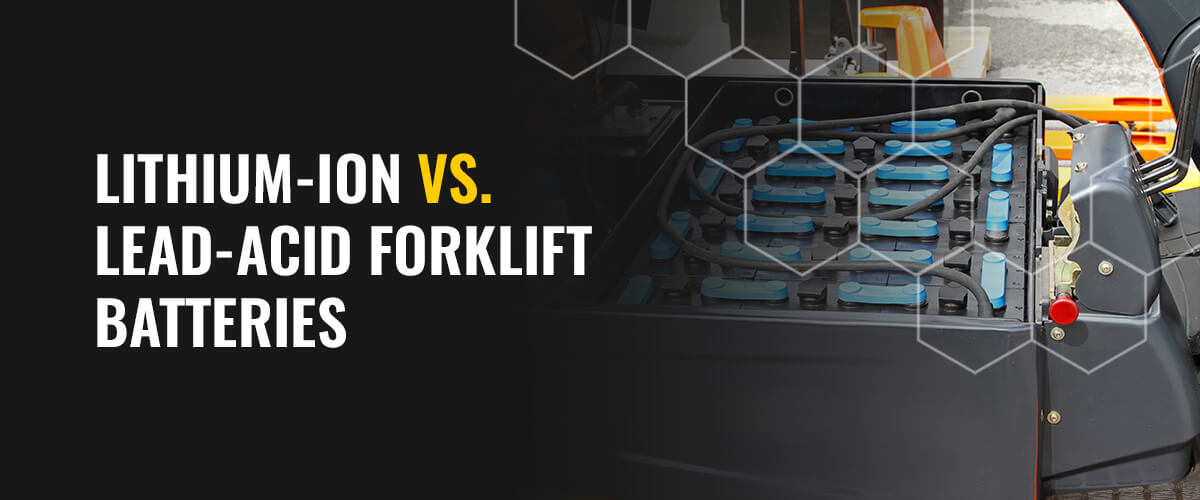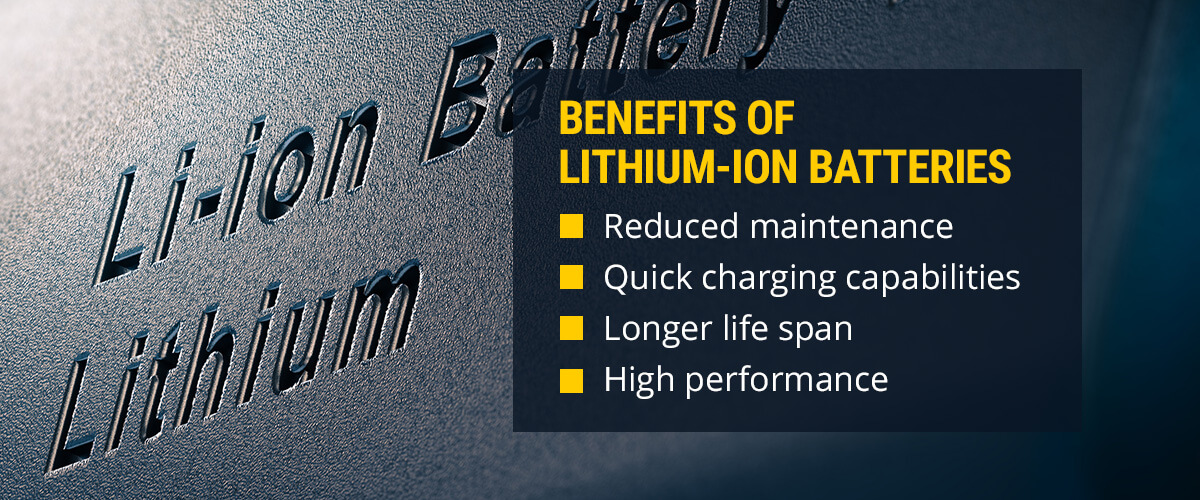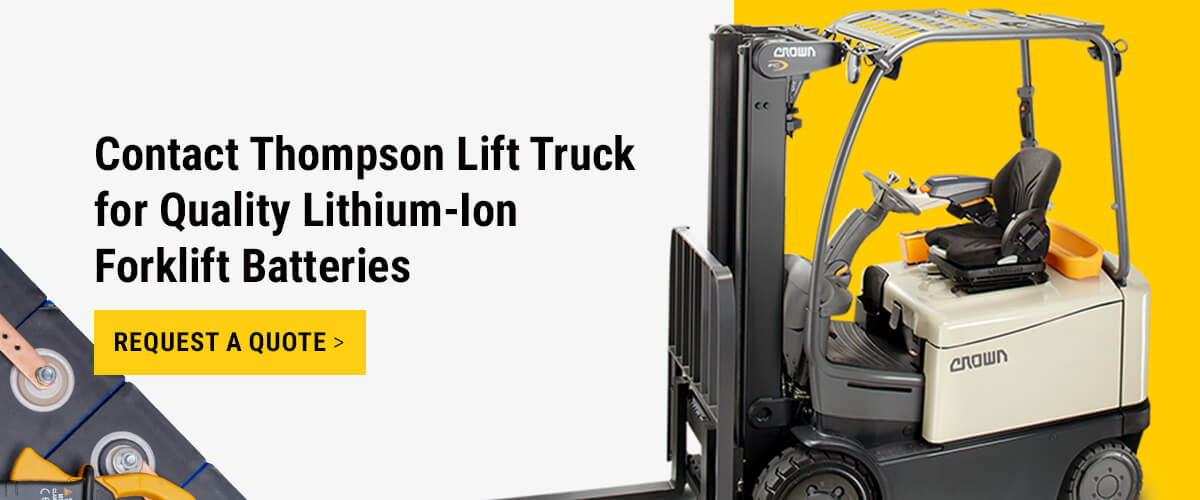
Lithium-Ion vs. Lead-Acid Forklift Batteries

Forklifts are ideal for multiple jobs, especially when moving heavy loads more efficiently and quickly across your work environment. A forklift battery is what supplies the necessary power for these machines to allow them to meet the needs of your applications.
Two primary battery types are used in forklifts — lithium-ion and lead-acid. Each battery has distinct benefits for different applications. Learn more about the difference between lithium-ion forklift batteries versus lead-acid batteries.
What Is a Lithium-Ion Forklift Battery?
Lithium-ion batteries for forklifts are rechargeable graphite and lithium batteries with low discharge rates and high energy density. A forklift lithium-ion battery is more lightweight than lead-acid batteries, though they still require machinery to move. Since these batteries weigh less, you may need to add a metal plate to prevent your forklift from tipping over when carrying heavy loads.
Lithium-ion forklift batteries may have a higher purchasing price than lead-acid batteries but can have lower maintenance costs, which can offset the initial purchasing price. These batteries can also be charged faster, so you can charge them during breaks.
What Is a Lead-Acid Battery?
Lead-acid batteries are rechargeable and have a higher power-to-weight ratio. These forklift batteries are often sought after for their lower price. Lead-acid batteries for forklifts are typically the standard in many industries due to their capabilities and low cost. When you buy an electric forklift, they often come with lead-acid batteries.
Despite the low purchase price, lead-acid batteries have several long-term expenses, including weekly maintenance and a dedicated space for charging when you use them for multi-shift operations. These batteries also need regular cleaning and watering, requiring a specialized watering system, trained personnel, and safety equipment.
Lead-acid batteries weigh more than lithium-ion batteries, which is essential in some applications. Forklifts can carry particularly heavy objects and sometimes need something to balance the weight. These batteries can prevent forklifts from tipping over when carrying heavy loads.
Lithium-Ion vs. Lead-Acid Forklift Battery Benefits
Each battery has unique advantages that make them better suited to some applications than others. Below, you’ll learn about the different benefits of each battery type and a few of their potential drawbacks:
Benefits of Lithium-Ion Batteries
Lithium-ion batteries aren’t the standard for forklifts, but more industries are switching to these batteries for a good reason. Some of the benefits of these options include:
- Reduced maintenance: Lithium-ion batteries have a higher purchasing price, but they require less maintenance than lead-acid batteries, which can help save on cost.
- Quick charging capabilities: Lithium-ion batteries can charge faster than lead-acid batteries. You can even charge these batteries during breaks rather than having to wait for them to reach a full charge.
- Longer life span: Lithium-ion batteries have a longer operational life than lead-acid batteries, making them a more worthwhile investment for some industries.
- High performance: These batteries have consistently high performance and voltage, which helps maintain consistent power for the forklift.
Lithium-ion batteries also have some factors to consider before committing to them as your final choice. For example, these batteries have higher upfront costs and less weight to use as a counterbalance for heavy forklift loads, often requiring a metal plate.
Benefits of Lead-Acid Batteries
Lead-acid batteries come with most forklifts, making them the standard for many applications. These batteries have some unique benefits, including:
- Cost: Lead-acid batteries have a more affordable purchasing price compared to lithium-ion batteries, which can be more cost-effective for some businesses.
- High energy density: Lead-acid batteries have a high energy density, making storing large quantities of energy in small spaces easier.
- Durability: Lead-acid batteries are designed to be more robust, making them capable of withstanding hard working conditions and environments. These batteries can withstand shocks, vibrations, and extreme temperatures.
- Recyclability: Lead batteries are 100% recyclable, which makes them a great way for businesses to improve their sustainability practices.
While lead-acid batteries have some considerable benefits, there are also some drawbacks to consider when deciding between the two. Lead-acid batteries have extensive maintenance requirements, heavier weight, longer recharge times, and limited life spans.
Lithium-Ion Forklift Batteries vs. Lead-Acid: Which is Best for You?
The best type of battery for your forklift will depend on your applications. Lithium-ion batteries require less maintenance and have a faster charge rate, longer life span, and more significant return on investment, while lead-acid batteries are more affordable, especially if you only need to use them occasionally.
Lithium-ion forklift batteries may be better if running multiple shift applications with several forklifts. Lead-acid batteries may be more cost-effective if you only occasionally use a few forklifts rather than as part of your everyday operations.
Factors to consider that can help you make a decision include:
- Length of service life: Lithium-ion batteries have a longer life span, meaning they won’t need to be replaced as regularly as lead-acid batteries. However, if you don’t use your forklifts often, a lead-acid battery can meet the need of your applications.
- Maintenance and labor requirements: Lead-acid batteries have more lengthy maintenance requirements and long charge times. You’ll need to have trained personnel to ensure you can get the most out of the life span of your lead-acid batteries. If you have fewer untrained personnel and don’t have the proper equipment to perform weekly maintenance on your lead-acid batteries, you may be better off choosing a lithium-ion battery.
- Existing forklift equipment type: Look at your forklift model and specifications, such as the battery compartment size and voltage. Your existing equipment will determine what type of battery is best suited to your applications.
- Battery compatibility with your forklift applications: Look at your forklift’s hours of operation, travel distance, load weights, and typical lifting heights. Understanding the applications of your forklift can help you choose a battery that meets your needs and performance goals.
- Environmental temperatures: When lead-acid batteries charge, they can become hot, meaning you should only charge them in temperature-controlled spaces.
Contact Thompson Lift Truck for Quality Lithium-Ion Forklift Batteries
If you want to use lithium-ion batteries for your forklifts, Thompson Lift Truck can help. Our high-quality lithium-ion batteries are the best option for industries looking to get the most performance out of their batteries. Our batteries are proven to perform in the toughest conditions and have a more robust life span and efficiency.
Thompson Lift Truck is a supplier of lithium-ion forklift batteries for businesses in Georgia and Alabama. Our expert team can help you find the best battery for your forklift and applications. Request a quote today to get started!


